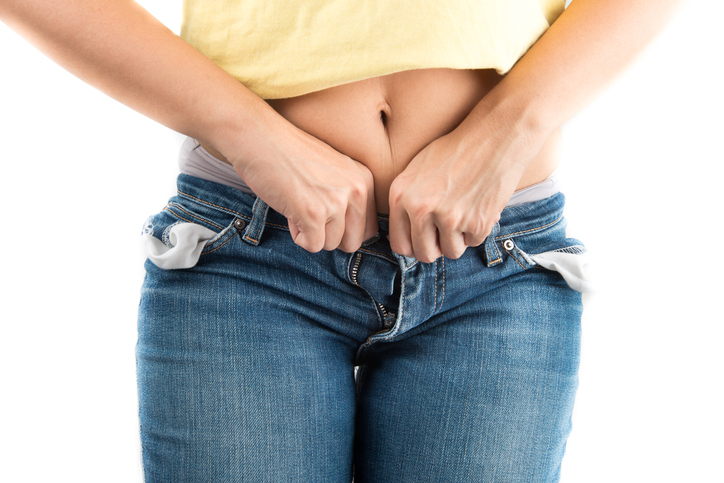Reasons For Belly Fat – Whatever Your Age
If belly fat is a concern, could some of these be part of the problem?

Belly fat can occur at any age, but there are a number of reasons that might contribute to that.
Eating the wrong foods
Unhealthy eating is the biggest driver of big bellies. Too many starchy carbohydrates and bad fats are a recipe for that midsection to expand.
Instead, get plenty of vegetables, choose lean protein, and stay away from fat from red meats.
Choose healthier fats in things like fish, nuts, and avocados.
Even a moderate cutback on carbohydrates (grains, pasta, sugars) can help, too.
Eating too much
That under-skin belly fat (called subcutaneous) and the fat under your abdominal muscles and around vital organs (called visceral) need to go.
Visceral fat makes cardiovascular disease and diabetes more likely. It can also lead to high blood pressure and more.
Eating too much is at least partly to blame for that flab. Limiting your portions can keep visceral fat down.
Smoking
We all know the dangers of smoking but one study showed that it leads to more abdominal and visceral fat.
So if you needed one more reason to quit, you have one.
Stress
When the stress hormone cortisol goes through your body, fat takes residence in your belly.
There are a number of ways to tackle this: exercise can help ease it, as can things like meditation and yoga.
Put together a good support system and talk to your doctor or a counsellor or therapist if you need it.
Not exercising enough
Nobody said shedding belly fat was going to be easy but if your belly is stretching the tape measure too much – and for women, more than 35 inches is too much.
What you need is moderate physical activity (like walking) for at least a couple of hours a week, or more vigorous exercise for an hour, and strength training at least twice a week.
As a precaution, always check with your doctor first before starting any new exercise routine.
Doing the wrong exercises
Doing sit-ups aren’t enough as you also need weight training to build muscle and more muscle means more calorie burning.
That said, if you can only do one exercise, choose aerobic exercise (like walking or running) as it works best for burning fat.
Make it a habit, and very slowly increase the intensity to get the results you’re after.
Beer & alcohol
It’s not just beer and the carbohydrates in beer that make that your belly expand as all alcohol has calories.
If you take in too many calories, especially if you’re not exercising and eating well, then you’re going to pack on the pounds.
If you drink, remember to do it in moderation.
Overdoing sports and energy drinks
Sports drinks can have a lot of sugar and that means a lot of calories. If you drink too many of these, you’re setting yourself up for weight gain that might end up around your stomach.
Cut back on sugary, high-calorie drinks and that means energy drinks and non-diet soft drinks too.
Not drinking enough water
Studies show that drinking more water can help you lose weight as choosing water instead of sweetened drinks means fewer calories.
That can help you trim that belly fat as it’s also the only drink that gives you hydration without added sugar or other ingredients.
Genetics
Your family tree affects your chances of obesity and has a say in where you store fat.
Striking the right balance between how many calories you take in (your diet) and how many you burn (through exercise) can help keep you from gaining weight, despite your genes.
Not sleeping well
Those nighttime raids on the fridge are diet killers. Not only that, if you’re not sleeping, you’re jump-starting stress hormones those encourage your body to keep fat.
Learn good sleep-time habits, like:
- Put down the phone
- Turn off the tablet or laptop
- Go to bed at the same time each night
- Avoid alcohol before bed
- Get enough exercise.
Obsessed with the scales
Here’s some good news: you might be losing that belly fat and not even realise it.
If you’re eating well and exercising right, remember that how your clothes fit, measured by your waist size, is more important than what the scale says.
If that waistband is less snug, you may have replaced some belly fat with muscle.
Helpful information:
Bloating and a bigger belly are often linked to oestrogen dominance, so rebalancing hormones can often be a first step to getting this under control.
Sometimes if your gut bacteria is also imbalanced that can also cause bloating so look at whether a probiotic could help.
https://anna.blog.wellsprings-health.com/tips-to-reduce-bloating/



















